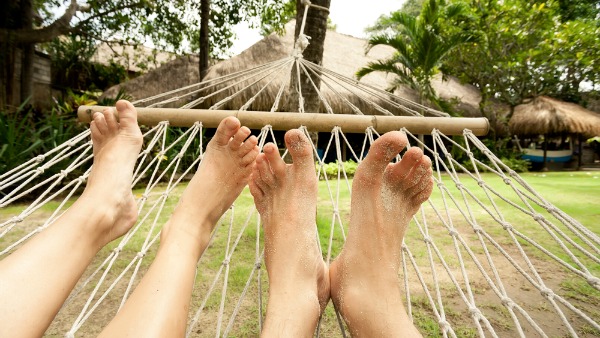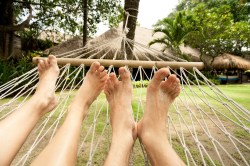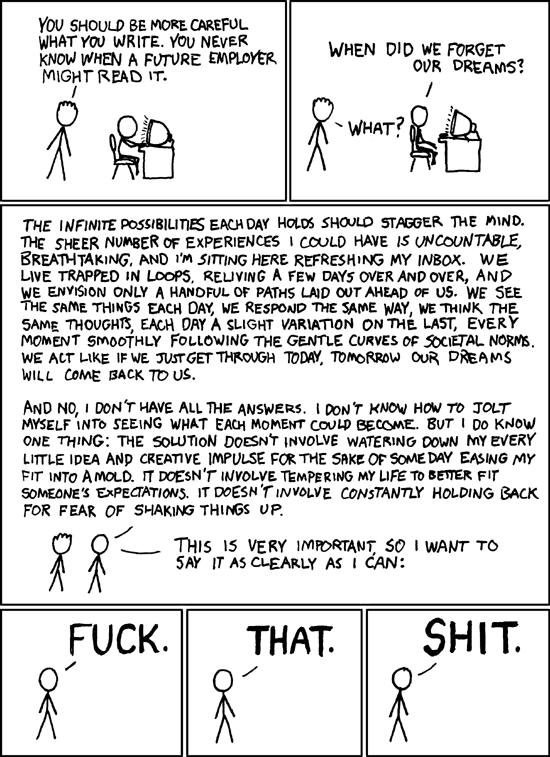A little less than two years ago, I wrote a post called “the medium chill,” about efforts by my wife and me to step off the “aspirational treadmill” and accept some material constraints in exchange for lives with more free time, relationships, and experiences. It has gone on to be my most popular post ever. I don’t know if it got the most hits, but it has solicited the most feedback, by a wide measure. It is one of very few posts I’ve ever written that is regularly mentioned to me by Normal People, i.e., people outside my online circles of green wonks and political obsessives. Several people have told me it gave them a way to express something they’d already been thinking, which is pretty much the nicest thing you can say to a writer.
Anyway, in some modest way, it resonated. Since Grist’s theme this past month has been “happiness,” my editor asked me to revisit the essay and talk a little about how my thinking has (or hasn’t) changed. So here goes. Pardon me if this is a little discursive and rambly — and by a little I mean a lot.
If I had to sum up, I’d say that I’m more skeptical/cautious about one part of my post and more committed than ever to the rest of it.
First, the part I’m more skeptical about. In my post, I cited research showing that above a certain level of income, money brings no further happiness. This is known as the Easterlin paradox, based on the work of USC professor Richard Easterlin. Those who want government to focus on quality of life rather than GDP (like me!) are very, very fond of citing this research, to the point that it’s become a bit of a cliche, something “everyone knows.”
The problem is that Easterlin got it wrong — or at least, it sure looks like he got it wrong. I was going to round up some of the new research on this, but Dylan Matthews already did it for me. He sums up:
There is a clear upward relationship between income and happiness. It’s just logarithmic: the happiness value of the next dollar you earn is always worth less than the one you earned before it.
(If you want to dig in on this, read Stevenson & Wolfers [PDF].)
The relationship between money and happiness gets weaker as you climb the income scale, but it never completely dissociates. (Note the obvious implication: the same dollar brings more net happiness to a person the lower their income. We’ll return to that point in a minute.) Some related research shows that happiness may max out around $75,000, but life satisfaction continues rising with income, basically forever.
Now, what are we to make of this? We should be careful about overinterpreting these findings (see: the headline on Matthews’ piece, which may or may not have been written by Matthews). There’s still a great deal we don’t know about the dynamics of happiness, about exactly why it appears to be coupled to income and about what exactly people mean when they express life satisfaction. I am, as a general matter, deeply suspicious of self-reported happiness measures anyway — just as we can be wrong about what will make us happy in the future, we can be wrong about what makes us happy in the present. That might sound peculiar, particularly to an economist who defines happiness as the satisfaction of preferences, but we do not often understand why we feel what we feel or what will make us feel better. We see our own inner selves through a mirror, darkly. As it were.
Nonetheless! There’s no denying the fact that “chill,” of any sort, is a privilege enjoyed by a very small number of the global wealthy. It takes only $34,000, after taxes, to be among the world’s richest 1 percent. My family is among the globe’s wealthiest 0.06 percent. (You can find out where you rank here.)
How did I rise to these lofty economic heights? According to World Bank economist Branko Milanovic, about 60 percent of it is attributable to the fact that I had the great foresight and wisdom to be born in the United States. Another 20 percent is due to my choice of parents — they were lower-middle class, basically, but they kept me well-nourished, healthy, and intellectually stimulated. Also I chose good genes. The same is true for my wife.
If you tally it all up, I’d say about 90 to 95 percent of our current good fortune can be attributed to circumstances that unfolded before we were legal adults making our own choices. And trust me: There’s been plenty of dumb luck since then, too. It’s not that we didn’t work hard — we did. But did we work that much harder than, say, a farmer in India? We have hundreds of times what he has. Did we work hundreds of times harder? Of course not. We’re just hundreds of times luckier. The notion of a “meritocracy” is plausible only to those who need to justify their luck.
Where does that leave us? For one thing, I think everyone could stand to be more cognizant and appreciative of a) the logarithmic connection between wealth and happiness, and b) the substantial role of luck in life’s outcomes. Or to put it another way: The poor need money more than the rich do, and the fact that the poor are poor and the rich are rich is largely a result of chance and contingency. Together, those two facts argue for more redistributive public policies: things like more open borders, a guaranteed basic income, (real) universal health care, universal daycare and early childhood education, and oh yeah, aggressive climate change mitigation and adaptation. Or to put it more pithily, they argue for liberalism.
So, to my way of thinking, anyone who finds themselves in a position where they can even contemplate “chilling” should be insanely grateful and, more than that, working to create the kind of world where more people can enjoy that privilege. But being lucky (like me and, if you’re reading this, probably you) doesn’t only mean gratitude and responsibility. It also means opportunity — the opportunity to live a good life.
In these neoliberal times, the notion of a good life has become almost entirely economized. There are no communities, only economies, no citizens, only consumers. New York Times columnist Tom Friedman is the great chronicler of this dystopia, not least because he seems to find it all quite congenial. Today he writes of a “401(k) world” in which everyone agrees to pretend luck doesn’t exist and “your specific contribution will define your specific benefits.” In the words of a consultant Friedman quotes, “a 401(k) world requires you to learn much more about investing in yourself: how do I build my own competencies to be attractive to employers and flourish in this world.” Such is the road to flourishing, the key to a good life: become attractive to employers. You are an investment. The world is defined by a tax provision.
I’m sorry, I just find that horrifying. I don’t want to get all dreamy and romantic on you, but … well, yeah, I do. Surely there is more to life than making oneself attractive to an employer! Surely there is more than, as Bill Clinton (and now Obama) says, “working hard and playing by the rules” — the game in question being globalized capitalism, presumably.
Surely we have higher aspirations. I was just reading the classic Oscar Wilde essay, “The Soul of Man under Socialism,” and it got me all fired up about this again. Like most Wilde, it is alternately inspiring, delightful, and utterly loopy. He envisions giving all degrading manual labor over to machines, freeing humans to pursue their own fulfillment, and he’s only half-kidding, I think. Individualism, he says, is the highest aspiration, but not individualism like we think of it, the relentless pursuit of material advantage, but individualism in the sense of authenticity.
In a community like ours, where property confers immense distinction, social position, honour, respect, titles, and other pleasant things of the kind, man, being naturally ambitious, makes it his aim to accumulate this property, and goes on wearily and tediously accumulating it long after he has got far more than he wants, or can use, or enjoy, or perhaps even know of. Man will kill himself by overwork in order to secure property, and really, considering the enormous advantages that property brings, one is hardly surprised. One’s regret is that society should be constructed on such a basis that man has been forced into a groove in which he cannot freely develop what is wonderful, and fascinating, and delightful in him — in which, in fact, he misses the true pleasure and joy of living.
Wilde wrote that in 1891. Imagine if he could see our 401(k) world …
Then he really gets going:
And so he who would lead a Christlike life is he who is perfectly and absolutely himself. He may be a great poet, or a great man of science; or a young student at a University, or one who watches sheep upon a moor; or a maker of dramas, like Shakespeare, or a thinker about God, like Spinoza; or a child who plays in a garden, or a fisherman who throws his net into the sea. It does not matter what he is, as long as he realises the perfection of the soul that is within him.
I’m much more of a communitarian than Wilde. I believe the good life involves not only cultivating what is best in you, acting with purpose and joy, but also being at the center of a sturdy web of connections: family, friends, communities, and circles of interest. We become our best selves in part by loving others and being loved, valuing others and being valued.
But yeah, this kind of talk sounds faintly absurd these days. We Americans schlep to jobs that 70 percent of us don’t give a sh*t about. Then we come home and watch TV — 34 hours a week of it. The very idea of living a life of aesthetic and moral quality, of developing our passions and finding our best selves, of contributing something of worth to humanity … it all seems far away and silly. We just work to keep existing, and exist to keep working.
As always, XKCD puts it best:
“To live is the rarest thing in the world,” Wilde says. “Most people exist, that is all.” That’s what I was getting at with the medium chill — not just chilling out and working less, “taking it easy” or whatever, but trying to live, to break free of the soul-numbing expectations and routines of late capitalism and instead construct a life rich in relationships and experiences. A meaningful life.
To sum up this unwieldy beast of a post, for those hardy enough to still be reading, I guess it’s about balance. We can’t forget how lucky we are; we can’t stop fighting for a world in which more people are freed from the degrading stresses of material want and insecurity. But we also can’t forget that blessings give us the opportunity to live lives of quality and purpose and service and love. Take a look at the top five regrets of the dying. Think about what it would take to have none of those regrets on your death bed. That’s the medium chill.
——
Read the original medium chill piece.







